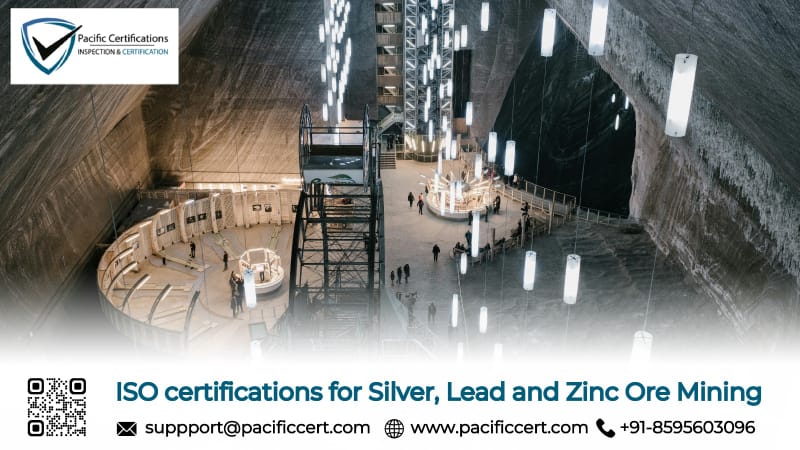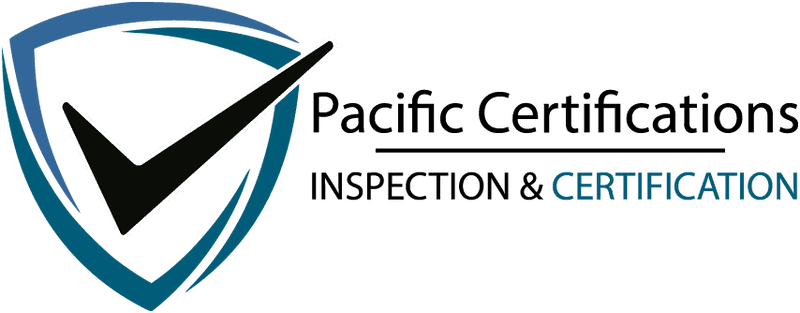ISO Certifications for Silver, Lead and Zinc Ore Mining Requirements and Benefits

The mining industry, particularly those involved in extracting precious and base metals like silver, lead, and zinc, plays a pivotal role in the global economy. Ensuring that mining operations are efficient, environmentally friendly, and safe is paramount.
ISO certifications are instrumental in helping mining sector achieve these goals by providing a framework for quality management, environmental stewardship, occupational health and safety, and more.
Applicable ISO Standards for Silver, Lead, and Zinc Ore Mining
ISO 9001:2015 - Quality Management Systems
- Ensures that mining operations meet customer and regulatory requirements consistently.
- Focuses on continuous improvement and operational excellence.
ISO 14001:2015 - Environmental Management Systems
- Provides a framework for managing environmental responsibilities.
- Helps minimize environmental impact through efficient resource use and waste reduction.
ISO 45001:2018 - Occupational Health and Safety Management Systems
- Aims to reduce workplace injuries and illnesses.
- Enhances worker safety and well-being.
ISO 50001:2018 - Energy Management Systems
- Focuses on energy efficiency and reduction in energy consumption.
- Promotes sustainable energy use and cost savings.
ISO 26000:2010 - Social Responsibility
- Provides guidance on social responsibility for organizations.
- Encourages ethical behavior and sustainable development.
- Specifies principles and requirements for the design, development, and management of greenhouse gas inventories.
- Helps mining companies manage their carbon footprint effectively.
Click here to find out more applicable standards to your industry
How Pacific Certifications Can Help
As a leading certification body, we at Pacific Certifications are dedicated to providing audit and certification services to ensure your mining operations comply with the relevant ISO standards. Here's how we can assist:
Certification Audits:
- We conduct thorough certification audits to assess your compliance with the chosen ISO standards.
- Our audits are designed to identify areas of improvement and ensure that your processes align with international best practices.
Surveillance Audits:
- Regular surveillance audits help maintain your certification and ensure continuous compliance.
- We provide feedback and insights to help you stay ahead of regulatory requirements.
Re-certification Audits:
- At the end of the certification cycle, we conduct re-certification audits to renew your certification.
- This process helps reaffirm your commitment to quality, safety, and environmental stewardship.
Impartial and Independent Audits:
- Our audits are conducted impartially and independently, ensuring credibility and trustworthiness.
We do not offer consultancy services such as training, internal audits, or documentation preparation, maintaining the integrity of our certification process.
Contact us today to know how we can help you with your ISO certification requirement!
Market Research and Trends
In 2024, the mining industry faces increasing scrutiny over its environmental impact and sustainability practices. Companies are under pressure to adopt greener technologies and improve their operational efficiency.
The demand for ISO certifications has surged as stakeholders, including investors and regulators, seek assurances that mining operations adhere to stringent environmental and safety standards.
A Recent research indicates that mining companies with ISO certifications are better positioned to manage risks, improve operational efficiency, and enhance their reputation. Trends show a growing emphasis on sustainability, with companies investing in cleaner technologies and adopting comprehensive environmental management systems to reduce their carbon footprint.
Obtaining ISO certifications is a strategic move for silver, lead, and zinc ore mining businesses aiming to improve their operational excellence, ensure environmental stewardship, and enhance worker safety.
For more information on how we can assist you with your ISO certification needs, please contact us at [email protected]. Together, we can ensure that your mining operations meet the highest standards of quality, safety, and environmental responsibility!
Requirements & Benefits of ISO certifications for Silver, Lead and Zinc Ore Mining
ISO 9001:2015 - Quality Management Systems
Requirements:
- Top management must demonstrate leadership and commitment to the quality management system.
- Identify and address risks and opportunities that could impact product quality and customer satisfaction.
- Establish a process-driven approach to enhance operational efficiency and consistency.
- Understand and meet customer requirements consistently to enhance satisfaction.
- Implement a culture of continuous improvement through regular monitoring, measurement, and analysis of processes.
Benefits:
- Consistent delivery of quality products and services increases customer trust and loyalty.
- Streamlined processes reduce waste and improve efficiency.
- Certification provides a competitive edge and can open new market opportunities.
- Ensures compliance with legal and regulatory requirements, reducing the risk of penalties and legal issues.
ISO 14001:2015 - Environmental Management Systems
Requirements:
- Develop and implement an environmental policy that reflects the organization's commitment to environmental protection.
- Identify environmental aspects and their impacts to manage and mitigate adverse effects.
- Ensure compliance with applicable environmental laws and regulations.
- Establish measurable environmental objectives and targets to drive continuous improvement.
- Regularly monitor and measure environmental performance to ensure effective implementation of the EMS.
Benefits:
- Minimize negative environmental impacts through efficient resource use and waste management.
- Improved resource efficiency and reduced waste can lead to significant cost savings.
- Demonstrating environmental responsibility enhances the company's reputation and stakeholder trust.
- Ensures compliance with environmental regulations, reducing the risk of fines and sanctions.
ISO 45001:2018 - Occupational Health and Safety Management Systems
Requirements:
- Engage leadership and workers in the development and implementation of the OH&S management system.
- Identify workplace hazards, assess risks, and implement controls to mitigate them.
- Ensure compliance with occupational health and safety regulations.
- Set OH&S objectives and plans to achieve them.
- Monitor, measure, and evaluate OH&S performance to ensure continuous improvement.
Benefits:
- Reduces workplace accidents and injuries, ensuring a safer working environment.
- Ensures compliance with OH&S laws and regulations, reducing the risk of legal issues.
- A safer workplace enhances worker morale and productivity.
- Reduces costs associated with workplace injuries and illnesses, such as medical expenses and compensation claims.
ISO 50001:2018 - Energy Management Systems
Requirements:
- Develop an energy policy that commits to improving energy performance.
- Conduct an energy review to identify significant energy uses and opportunities for improvement.
- Set measurable energy performance objectives and targets.
- Implement operational controls to improve energy performance.
- Monitor and measure energy performance to ensure continuous improvement.
Benefits:
- Improved energy efficiency leads to reduced energy consumption and cost savings.
- Reduces greenhouse gas emissions and other environmental impacts associated with energy use.
- Ensures compliance with energy-related regulations and standards.
- Demonstrates commitment to sustainability, enhancing reputation and market position.
ISO 26000:2010 - Social Responsibility
Requirements:
- Demonstrate accountability and transparency in organizational decisions and activities.
- Promote ethical behavior throughout the organization.
- Engage with stakeholders to understand their concerns and expectations.
- Adhere to international norms of behavior.
- Ensure respect for human rights in all organizational activities.
Benefits:
- Enhances the organization's reputation and builds trust with stakeholders.
- Promotes a positive workplace culture, enhancing employee satisfaction and retention.
- Contributes to sustainable development by addressing social, economic, and environmental impacts.
- Identifies and manages social responsibility risks, reducing potential negative impacts.
ISO certifications provide significant benefits for silver, lead, and zinc ore mining sector, enhancing their operational efficiency, environmental performance, and safety standards.
Our expertise ensures that your certification process is thorough, credible, and aligned with international standards. By obtaining ISO certifications, your company can improve its market competitiveness, regulatory compliance, and reputation, paving the way for sustainable growth and success.
Pacific Certifications is accredited by ABIS, in case you need support with ISO certification for your Silver, Lead & Zinc Ore Mining Business, please contact us at [email protected] or +91-8595603096.
FAQ: ISO Certifications for Silver, Lead, and Zinc Ore Mining
What are the key ISO standards applicable to silver, lead, and zinc ore mining?
The key ISO standards include ISO 9001:2015 for Quality Management, ISO 14001:2015 for Environmental Management, ISO 45001:2018 for Occupational Health and Safety, ISO 50001:2018 for Energy Management, ISO 26000:2010 for Social Responsibility, and ISO 14064 for Greenhouse Gases.
Why is ISO 9001:2015 important for mining companies?
ISO 9001:2015 helps mining companies ensure consistent quality in their operations, meet customer and regulatory requirements, and drive continuous improvement, enhancing overall operational efficiency.
How does ISO 14001:2015 benefit mining operations?
ISO 14001:2015 provides a framework for managing environmental responsibilities, helping mining companies minimize their environmental impact, improve resource efficiency, and comply with environmental regulations.
What advantages does ISO 45001:2018 offer to the mining industry?
ISO 45001:2018 focuses on occupational health and safety, reducing workplace accidents and illnesses, enhancing worker safety and well-being, and ensuring compliance with OH&S regulations.
How can ISO 50001:2018 help mining companies?
ISO 50001:2018 promotes energy efficiency, reducing energy consumption and costs, minimizing environmental impact, and demonstrating a commitment to sustainable energy use.
What is the role of ISO 26000:2010 in mining?
ISO 26000:2010 provides guidance on social responsibility, encouraging ethical behavior, stakeholder engagement, and sustainable development in mining operations.
Why is ISO 14064 important for mining companies?
ISO 14064 helps mining companies manage their greenhouse gas emissions by providing a framework for GHG inventory, management, and reporting, aiding in reducing their carbon footprint and ensuring regulatory compliance.
How can Pacific Certifications assist mining companies in obtaining ISO certifications?
Pacific Certifications offers comprehensive audit and certification services, including certification audits, surveillance audits, and re-certification audits. We ensure that mining companies comply with relevant ISO standards through impartial and independent audits, helping them achieve and maintain their certifications.
What are the overall benefits of obtaining ISO certifications for mining companies?
ISO certifications enhance operational efficiency, environmental performance, worker safety, and market competitiveness. They ensure regulatory compliance, reduce operational risks, and improve reputation and stakeholder trust.
How do ISO certifications impact market competitiveness for mining companies?
ISO certifications provide a competitive edge by demonstrating commitment to quality, safety, and environmental stewardship. They can open new market opportunities, enhance customer and investor confidence, and improve the overall market position of mining companies.
Read More at: Blogs by Pacific Certifications

